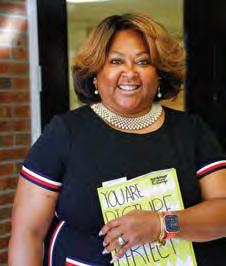
6 minute read
A PowerHouse Steps Up to Be Chief
By Megan M. Seckman Photo submitted
l YVETTE GENTRY
In 1990, at the age of 20, I became a dispatcher. That was my mother’s line of work, and I respected the work she did, so I followed in her footsteps. Later, my best friend and I became interested in law enforcement, so we took the test. This line of work was a natural progression for me in my life of public service, but I didn’t set out to become a police officer. I thought I was going to be a teacher — and I still want to be a teacher when I grow up. To hear from the community and start working on a shared agenda that incorporates looking for ways to improve the police department and the city overall. There needs to be systemic change, not just in law enforcement, but in many policies and practices within our city. I want to be crystal clear that my responsibility is to have a strong police department, examine our policies, and support our officers so that they can keep the community safe, but I also look forward to working and standing shoulder-to-shoulder with people throughout the community to address our needs. From the small pulpit of Louisville, the echo of “Say her Name” can be heard around the world. With daily protests now in their fifth month and a police force under a microscope, Yvette Gentry, interim Police Chief, has essentially walked into the eye of a storm. Before Chief Gentry took a leave of absence from her job in philanthropy at Metro United Way to accept this interim appointment, she had retired as deputy police chief in 2014 with a 20-year career in law enforcement. With the experience and community relationships she built on and off the force, she’s poised to be just the woman to help mend our fractured city. For now. Make no mistake, Chief Gentry walks into this position with a sense of duty to all of Louisville’s citizens — those in and out of the uniform — until it is time for her to pass the baton to Mayor Fisher’s permanent hire. Her goal until then is simple: Leave
WHY DID YOU DECIDE TO JOIN THE POLICE FORCE YEARS AGO? HOW OLD WERE YOU?
WHAT IS THE NUMBER ONE ACTION ITEM YOU HAVE ON YOUR LIST?
Louisville better than how she found it.
WHAT PREPARES YOU FOR THIS POSITION? WHAT HARD AND SOFT SKILLS MAKE YOU THE RIGHT PERSON FOR NOW?
I am prepared for this position because I have so many experiences with government and non-profit work: recreation, the zoo, the health department, the mayor’s office… I have developed many skills across all areas of government and have built lots of relationships across the community. That, coupled with my desire as a citizen to make this a better place, is what makes me the right person for right now. I gave up a lot of comfort to be here — to help others experience a better quality of life with the violence and unrest we are experiencing. My goal is just to leave the city better than I found it.
WHAT TYPE OF A LEADER ARE YOU? WHAT IS YOUR SKILL SET?
That is always a hard question for me to answer. Every position I have had, I give it my best. I am thorough and a hard worker. People use the term “servant leader.” I am a servant at heart. I am transformational, and that is what I want to be at the end of this.
HOW WILL YOU ADDRESS THE TENSIONS AND DISTRUST MANY BLACKS IN LOUISVILLE FEEL TOWARD THE POLICE? WHAT NEEDS TO BE DONE TO MEND THESE RELATIONSHIPS?
It is interesting because the relationship is fractured. Many of the men and women who are out here protesting daily in the streets are not necessarily from Louisville. We don’t hear all the facts, and we need to start telling all the truths.
Reform is about holding the right people accountable. One of the challenges of law enforcement is that we always hold the front person accountable without examining the entire system. There is a whole system of people who are supposed to support, hold the officers accountable, etc. But we only want to cast stones at the front person. In education, the teacher is right in front of the student, they are the face, but the teacher can’t be blamed for every issue happening in their class. That teacher may have asked for support and tools that they didn’t receive — and the teacher can’t fix every problem in society.
The community needs to understand that systemic change is needed, not narrow the focus of responsibility.
The community has to decide that they are open to authentic engagement with law enforcement. I can hold an officer accountable for being courteous. But the community has to give law enforcement a chance to build relationships — the same bricks you use to build a wall can build a bridge. We have to build up trust and tell the truth. Most people respect their local beat officer. The leaders in the system also need to work to build that trust.
A lot of trust comes from leadership. I have to accept responsibility for my part in that system.
WHAT DO YOU WISH CIVILIANS KNEW ABOUT BEING A POLICE OFFICER?
People don’t realize the interactions and will be able to provide the
magnitude of work put on the shoulders of patrol officers without the proper training they need. The 30 hours of training about the law and a gun are not enough.
Most calls after 4pm are addiction and mental health calls, and the only ones who respond to a call to the scene are police. Holding officers accountable for outcomes they aren’t trained for is irrational and unfair. We need other professions to mobilize as well. You wouldn’t accept a podiatrist to do the work of a heart surgeon. It is the same thing — police need other professionals to assist with their calls. This is happening all across the country. We need to build the stadium for this, and it is going to take time, but we are laying
WHAT TOOLS AND RESOURCES DOES LMPD NEED IN ORDER TO DO A BETTER JOB OF PROTECTING AND SERVING THE COMMUNITY?
Partnering with other entities. Divesting and defunding is about taking some of the responsibilities away from law enforcement. We need to figure out ways to decrease public contact with the police. Once we do that, we will decrease negative and fatal the foundation now.
time it takes to build a relationship.
WHICH CITIES DO YOU LOOK TO AS A MODEL POLICE FORCE FOR LMPD TO ASPIRE TO?
There are a lot of positive models in social work. Part of my job is that I have to reimmerse myself in the research. I have been overwhelmed with people reaching out with ideas and best-practices, but I need to spend some time with the community and the officers to reach all parties who haven’t had their voices elevated. No one has a lightning in a bottle approach. My priority is making citizens and officers — officers are citizens, too, we can’t forget that — feel safe in their communities.
WHAT DO YOU HOPE WILL DEFINE YOUR LEGACY?
She came. [Yvette laughs] Again, I just want to leave the city better than I found it.
WHAT ARE YOUR PLANS AFTER THIS POSITION? WHAT IS NEXT FOR YOU?
To go home and enjoy seeing LMPD in a better place. To sit on my back deck with my granddog and kids, in peace, knowing that Louisville is a safer city. I want to sit... Then I’ll go back to my nonprofit work.










